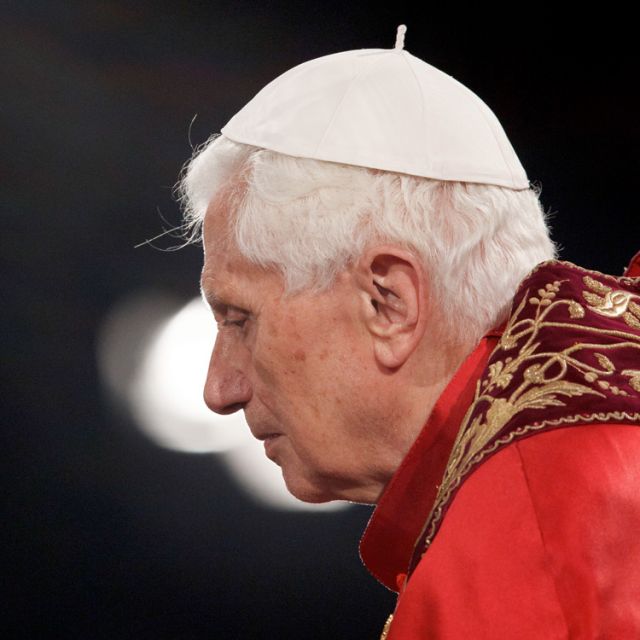Last fall, the Pope stopped walking in processions up the main aisle of St. Peter's and started riding a mobile platform instead; in March, it was revealed that he sometimes walks with a cane. The pope's schedule grew lighter last year, as he stopped meeting one-on-one with most visiting bishops. During this year's Holy Week liturgies, television viewers around the world could see unmistakable signs of fatigue on the pontiff's face.
VIEW MORE PHOTOS ON FACEBOOK
While none of this suggests that the Pope does not have years of life ahead of him, a number of commentators have asked in print, and many more have done so off the record, if he might be getting ready to step down. Pope Benedict himself has said that a Pope might have an "obligation to resign" once he "is no longer physically, psychologically, and spiritually capable of handling the duties of his office." Americans may be especially inclined toward such speculation at the moment, encouraged by last month's release of the Italian movie "We Have a Pope," in which a fictional pontiff flees from the demands of office.
As tempting as filmmakers and journalists might find so dramatic a scenario, the evidence for it is less persuasive when seen in proper context. Consider, for example, that the public first saw Pope Benedict walking with a cane as he was about to board a plane for a 14-hour flight to Mexico, the first stop on a six-day trip that also took him to Cuba. Less than 78 hours after returning from Havana to Rome, the presumably still-jet-lagged Pope was offering Palm Sunday Mass in St. Peter's Square, the first celebration in his busiest week of the liturgical year.
No clear-eyed observer can deny that Pope Benedict is unusually robust for his age. He is reportedly at work on the third volume of his bestselling "Jesus of Nazareth" series and is presumed to be writing at least one encyclical: on the theological virtue of faith, to follow his works on charity ("Deus Caritas Est") and hope ("Spe Salvi"). The Pope will be traveling to Lebanon this September, and the Vatican has done nothing to discourage the widespread assumption that he will follow established papal precedent by attending World Youth Day celebrations next summer in Rio de Janeiro.
As the Pope told former Cuban leader Fidel Castro, also 85, at a meeting in Havana in March: "Yes, I'm old, but I can still carry out my duties."
Pope Benedict's vitality is strikingly clear when one compares his physical and mental state with that of his predecessor. The current pontiff is already older than Blessed John Paul II was when he died in 2005, after a long struggle with Parkinson's disease and other ailments.
The contrast between the two men is especially significant when one considers that Blessed John Paul seriously considered resigning on at least two occasions, his 75th and 80th birthdays, according to books by his former personal secretary and the postulator for his canonization.
The postulator, Msgr. Slawomir Oder, has written that Blessed John Paul sought the guidance of experts as he pondered resignation, "consulting in particular then-Cardinal (Joseph) Ratzinger," now Pope Benedict.
Whatever Cardinal Ratzinger may have advised, Blessed John Paul finally decided that it was, in his own words, his "duty to continue to carry out the job for which Christ the Lord has called me, as long as he, in the mysterious designs of his providence, will want."
If a leader as traditional as Pope Benedict does not consider Blessed John Paul's example a binding precedent, he clearly sees it as an inspiring standard for his own conduct. Concluding his homily at Blessed John Paul's beatification Mass last May, Pope Benedict paid a personal tribute to his predecessor's "witness in suffering."
"The Lord gradually stripped him of everything," Pope Benedict recalled, "yet he remained ever a 'rock,' as Christ desired. ... In this way he lived out in an extraordinary way the vocation of every priest and bishop to become completely one with Jesus, whom he daily receives and offers in the church."


